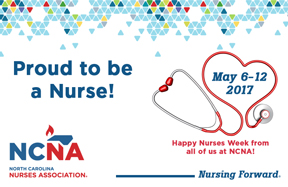NCNA News
Nurses: Comprehensive Care from Health Leaders

May 6, 2017
Nursing: The Balance of Mind, Body, and Spirit is the theme for the 2017 National Nurses Week celebrations. Through this campaign, nurses are encouraged to model, practice and promote health for both themselves and those they serve. Chances are that you have a nurse within your family; if not, then surely within your network of friends. At some point in your life, you will most likely receive care from a nurse. Nurses provide comprehensive, compassionate care across a broad spectrum, from schools to hospitals, nursing homes and hospice, in public health departments, the military, clinics, private practices, faith-based organizations, and educational institutions.
For the15th consecutive year, nursing has been rated by Gallup as the most trusted profession by our citizens. This week as we celebrate nursing, it is imperative that we set aside time to acknowledge and recognize their service and contribution to the well-being and safety of each one of us.
Nurses serve in leadership roles as CEOs, CNOs, COOs, Health Care Administrators, and Managers. Just last month, Rear Admiral Sylvia Trent-Adams, PhD, RN, FAAN, was named acting Surgeon General of the United States. These nursing leaders are champions of the nurses within their organizations, with a focus on ensuring the provision of high quality care. Nurse leaders in education are responsible for the inspiration and education of our future nursing workforce, in the research field they are developing innovations and evidence of best practice.
We are fortunate to have three nurses serving in the General Assembly in North Carolina. Rep. Gale Adcock, D-Wake; Rep. Carla Cunningham, D-Mecklenburg; and Rep. Donna White, R-Johnston, are committed to promoting public policy and legislation that supports everyone’s right and access to healthcare.
Nursing is both an art and a science: the preparation for nurses includes graduation from an approved nursing program, successful completion of a national license examination, and registration by the North Carolina Board of Nursing. All nurses must meet ongoing competency requirements to maintain their license. Many nurses return to school after their basic preparation to obtain degrees at the master’s and doctoral level – including the four types of advanced practice registered nurses (APRNs): Nurse Practitioners, Certified Nurse Midwives, Certified Registered Nurses Anesthetists, and Clinical Nurse Specialists.
As the President of the North Carolina Nurses Association (NCNA), I have the distinct honor and privilege to lead the only organization that represents all Registered Nurses throughout North Carolina. If you are not a member, please take a few minutes to explore our organization at www.ncnurses.org and consider joining. Membership provides many benefits, including continuing education, mentoring, professional collaboration, and advocacy opportunities.
On behalf of the NCNA Board of Directors and the more than 120,000 Registered Nurses in North Carolina, I wish to extend a heartfelt thanks to all nurses in the state! Please join me and take a moment to say thank you to a nurse who you know, whether they might be a colleague, a spouse, a friend, or a care provider. They are deserving of our gratitude.
Warmest Regards,
Mary A. Graff, MSN, RN, NEA-BC
President, North Carolina Nurses Association